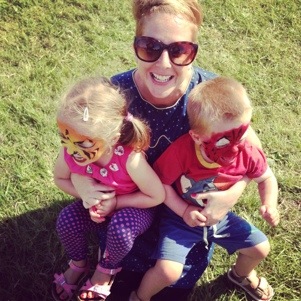When someone close passes away, it can be difficult to know how to help little ones to understand death and how cope with the loss.
This past week has been very difficult for us as a family losing someone very special to us and the littlies. It’s been their first experience of loss and our first time dealing with telling them everything.
Talking to children about death largely depends on their age, experiences and personality. A teen will deal with death very differently than a toddler would, so words, ideas and the approach are very different. In my training and experience it’s always been a very sensitive subject that you can’t go bulldozing in on.
It needs time, calmness and lot’s of patience and understanding – all of which is very hard when you are going through grieving yourself.
Whatever age of your child, there are a few important points to remember in all cases when dealing with loss, and so I thought I’d share them with you.
Be honest
It may seem easier to explain that a loved one has simply ‘gone away’ but this can lead to confusion, upset and misundertanding. A child will wonder ‘Where did they go?’ or ‘Why did they go?’ and feel lost.
Until children are around are about 4 or 5 years old (depending on their stage of development) their view of the world is very literal. For very young children it’s important to explain death in basic and solid terms, for example if the death was caused by illness it’s best to explain that the person was very poorly and their body had stopped working.
Explain to little ones that the doctors couldn’t fix them because their body was too broken. At this point it’s important to stress VERY poorly and to talk about coughs and colds or simple tummy ache being very different to bad illness or injury – you don’t want to worry littlies into thinking everytime they have a cold they might die.
Keep talking
Bare in mind that very young children may still continue to ask where the loved one is or when they will be coming back, because it is such an incredibly hard thing to understand, while you may feel frustrated and be dealing with your own grief, remember for them it is all confusing and worrying. Simply repeat what you have already said, and eventually they will understand.
There may be lots of questions which you’ll find difficult to answer, but encourage talking and answer the questions as best you can. This is a time when your own beliefs will come in.
Heaven, Angels and Stars
This will be a time where you may pass on your own beliefs to your children – whether that be heaven, talking about stars or even reincarnation. Try and explain things to very young children simply and calmly.
For me, I tell my young children that when you die you become a star in the sky. I find talking of Heaven confuses little ones – they may want to visit Heaven, and will find it hard to understand why they can’t. However, we all have our own ideas about dying, so make your own choices and stick to them rather than swapping and changing and confusing them.
Older children (pre- teens/teens) may have their own ideas about death and what happens after someone passes away. This is fine. Let them have their own thoughts even if they are different to yours. Grief is different for everybody.
It’s Ok to be sad
Crying is O.K and little ones need to know this as during a family loss grown ups will be upset and crying. Seeing grown-ups cry can upset very young children if they don’t know why they are crying.
Talking about feelings and how sadness and losing someone makes us cry, will help them understand their own feelings and those of others in the family.
Older children may take more comfort in their peers than other family members. Don’t feel rejected, it’s good if they are talking to someone rather than keeping it all into themselves. However – keep talking to them and asking if they are feeling O.K.
Reassure
Death is so final and makes us all think about our own mortality as adults. Children will often worry when someone close to them dies that someone else close to them will die soon too, or even themselves.
Talk openly and honestly about dying, read books together, watch films and be close as a family during this time of grief. Keep talking and keep listening.
Funerals
Everyone has different ideas about children at funerals and this decision can only be made by you as a parent if children are welcome to attend. Very young children may find funerals very upsetting, distressing and difficult to understand. As a parent I’d rather my children not attend a funeral until they were much, much older.
Outside help
Often older children may need extra help. There are many many resources available from books to therapists to community groups online. If you or your child is struggling to cope with losing a loved one the organisations below may offer some help and guidance.
As Parents we want to protect our children, to keep sadness and tragedy away, but sadly we can’t always can’t keep them from experiencing sadness and loss. Helping children to understand death helps them build emotional resources that they can rely on throughout the rest of their life.
Child bereavement UK
Winstons Wish
Cruse bereavement care







Jess
xxxxxxxxxxxxxxxxx loads of love